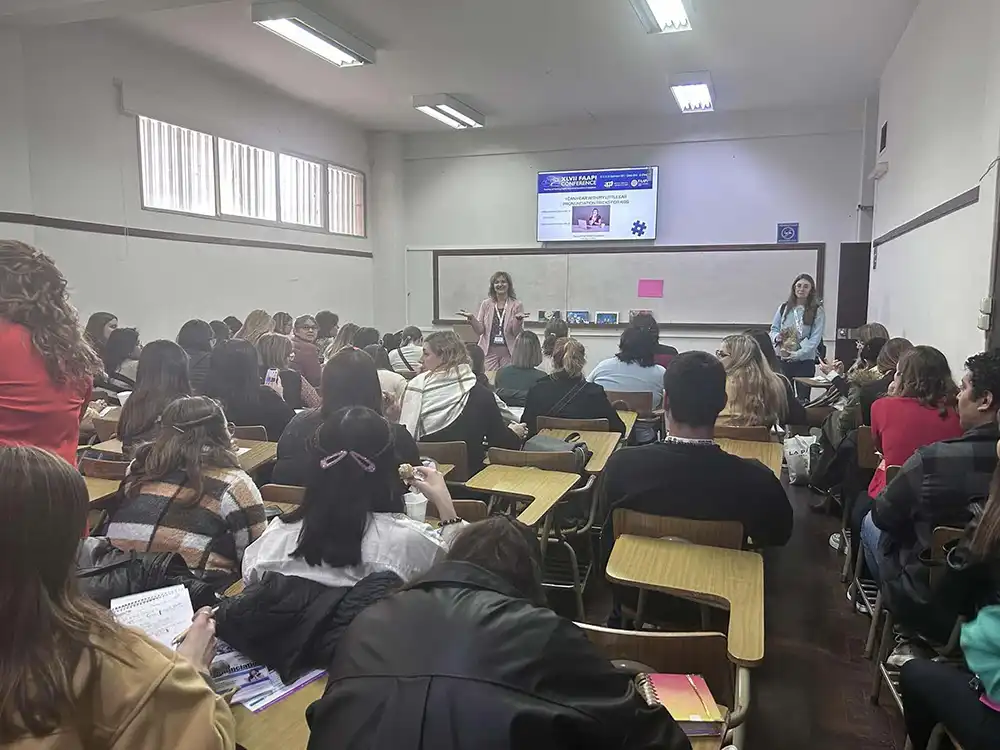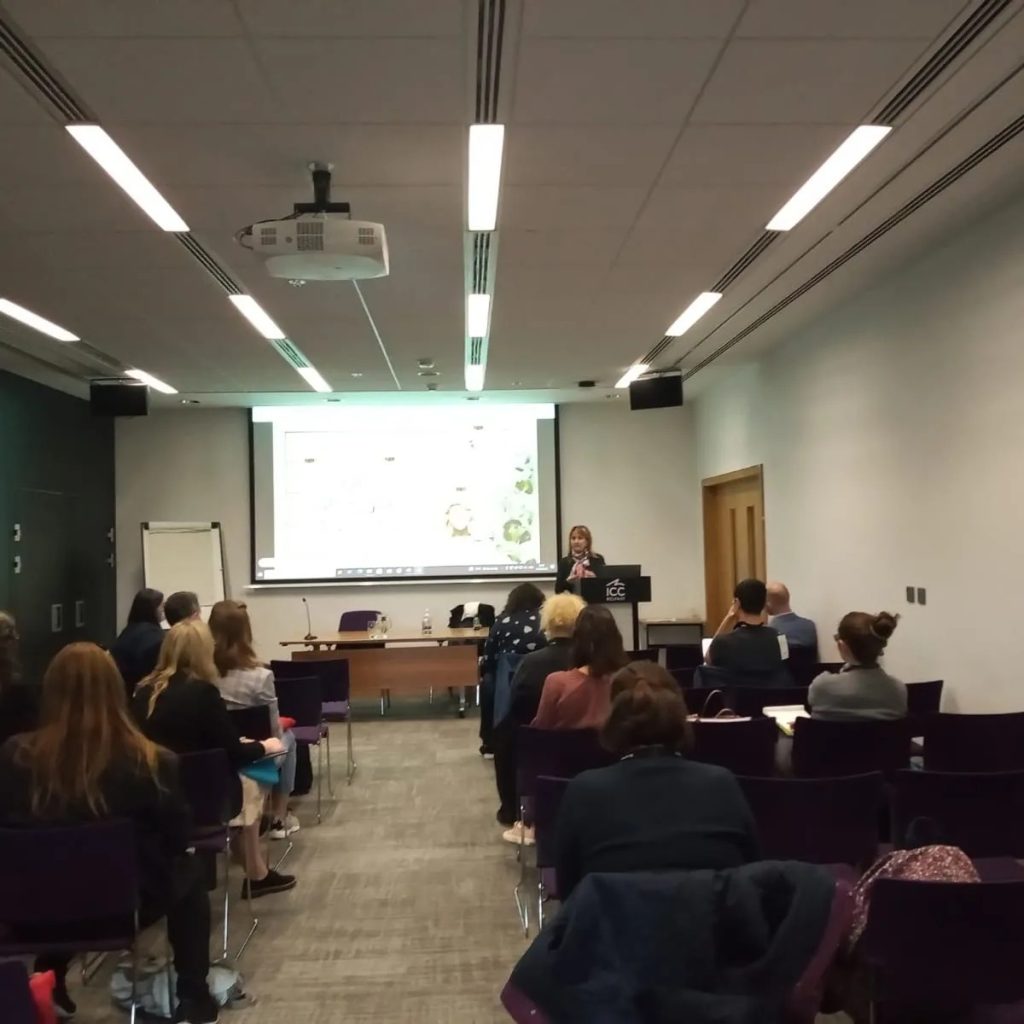
'Th Th Thumkie' book release at IATEFL International Conference Belfast 2022
Welcome to the support hub for EFL teachers integrating Emo-pron stories into their curriculum to enhance pronunciation lessons integrating reading and writing for young learners. Here, educators will discover comprehensive resources including lesson plans, engaging activities, catchy songs, and interactive games designed to take these stories into a deeper and more memorable method for acquiring English pronunciation. Join us in revolutionizing the way children acquire new language sounds, making the learning process both innovative and enjoyable.
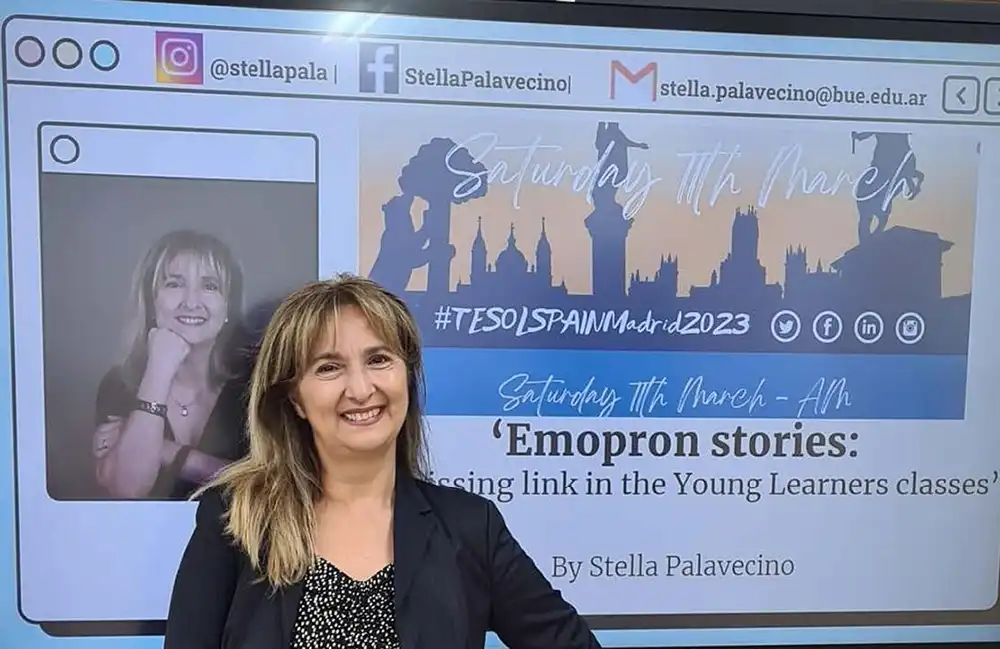
What are Emo-pron stories ?
Emo-pron (short for Emotion and Pronunciation) Stories is a collection of tales designed for young learners, presenting a novel approach to English as a Foreign Language (EFL) pronunciation instruction through emotional engagement, thus fostering reading and writing skills. Unlike traditional literary narratives, these stories introduce conflicts resolved not by moral lessons but by acquiring new articulatory habits, experienced by fantastical characters. Thus, Emo-pron highlights the role of emotions in fostering pronunciation in language acquisition. The stories bring about the significance of emotional engagement in the learning process, particularly in developing pronunciation skills. This concept reflects the understanding that emotions play a crucial role in language acquisition, contributing to enhanced learning outcomes
By listening to Emo-pron Stories, children encounter the resulting confusion that can arise in communication when ‘bin’ is mistaken for ‘pin’, as seen in ‘The Polar Bears’ Pin.’ Why is `p’ changed to ‘b’? Because aspiration is not a characteristic of many languages, it may not be naturally produced in accented syllables like ‘pin’ unless acquired organically. Explicitly explaining aspiration production would overwhelm children, but within the context of stories, an emotional connection is forged with the lessons. This emotional bond transforms young learners’ classrooms into effective and joyful environments for learning.
Unlocking Fun and Effective Pronunciation Learning for Kids: Introducing Emo Pron!
Are you an English teacher struggling to make pronunciation lessons engaging for young learners? Look no further! Let’s explore how Emo Pron, a creative teaching method, can transform your classroom into a dynamic and enjoyable learning environment.
Why Emo Pron?
Traditional methods like Phonics, which work wonders for native English speakers, often hit a snag with non-native learners. Imagine teaching the word "three" to a student whose native language lacks the "th" sound! Sounds like a challenge, right? That's where Emo Pron steps in.
The Emo Pron Approach
Emo Pron doesn't just teach pronunciation; it creates a magical world of learning through captivating stories and lovable characters. Picture a young learner embarking on an adventure with "Thumkie," a friendly character helping them conquer the tricky "th" sound. By engaging emotions and imagination, Emo Pron makes learning pronunciation both effective and fun.
The Science Behind It
Did you know our brains are wired for storytelling? Emo Pron capitalizes on this by weaving emotional connections into learning. When kids are emotionally invested in a story, their brains release chemicals that enhance memory retention. So, not only do they learn pronunciation, but they remember it too!
How It Works
Emo Pron stories aren't just entertaining; they're strategically designed to address specific pronunciation challenges. Through playful movements and relatable conflicts, children learn to articulate sounds correctly while having a blast.
What Makes It Unique?
Unlike traditional methods, Emo Pron tailors lessons to each learner's needs, ensuring no pronunciation hurdle is too high. With Emo Pron, every child can unlock their full potential in English pronunciation.
Get Started with Emo Pron Today!
Ready to revolutionize pronunciation learning in your classroom? Embrace the power of Emo Pron and watch your students' pronunciation skills soar!

'Th Th Thumkie' book release at IATEFL International Conference Belfast 2022
Welcome to the support hub for EFL teachers who are using Emo-pron stories to teach pronunciation to young learners. Teachers will find lesson plans, activities, songs and games that accompany these stories, and which will surely help children acquire the pronunciation of new English sounds through emotions in an innovative and memorable way.
Emo-pron stories are based on the need of the EFL learner to acquire new English sounds when working with Phonics. Phonics is a systematic approach to reading and writing, pronunciation and the English language, which seems to be ideal for children. The problem is that the material is designed for native speakers of English. There is a mismatch at this point. How can we make Phonics effective for the EFL learner? How can this be possible, considering that the major difficulty for them is the acquisition of English words and sounds before they actually learn to blend and segregate English words? The answer to this question lies in designing a phonological core (Jenkins, 2000), and activating previous knowledge. To this effect, some sounds have been selected to be the protagonists of the stories. (Click here to read about the Sound Priorities for Spanish Speakers suggested by the writer) For example, the story of Thumkie, who struggles to fit into the EFL classroom because children cannot see TH in words. This story will act as a scaffold to acquire the English sound through Thumkie and his friends (Palavecino, 2022).
Through fantasy, children are introduced to English sounds through stories that motivate them to easily remember the place of articulation of a new sound, notice, acquire, play and sing with the sounds that do not exist in their mother tongue.
Teachers will be delighted to see how simple it can be to transform their classes into cheerful pronunciation sessions, the main objectives of which will be creatively accomplished through stories, fancy characters, sound tricks, music and games. There is a world of Emo-pron stories for the EFL learner lying ahead. Come and discover it for yourself!
References
Jenkins J. (2000). The Phonology of English as an International Language. Oxford University Press.
Palavecino, S. (2024). ‘Emo-Prom Story Books & Resources.’ https://emopronstories.com.ar/efl-phonics-story-books.
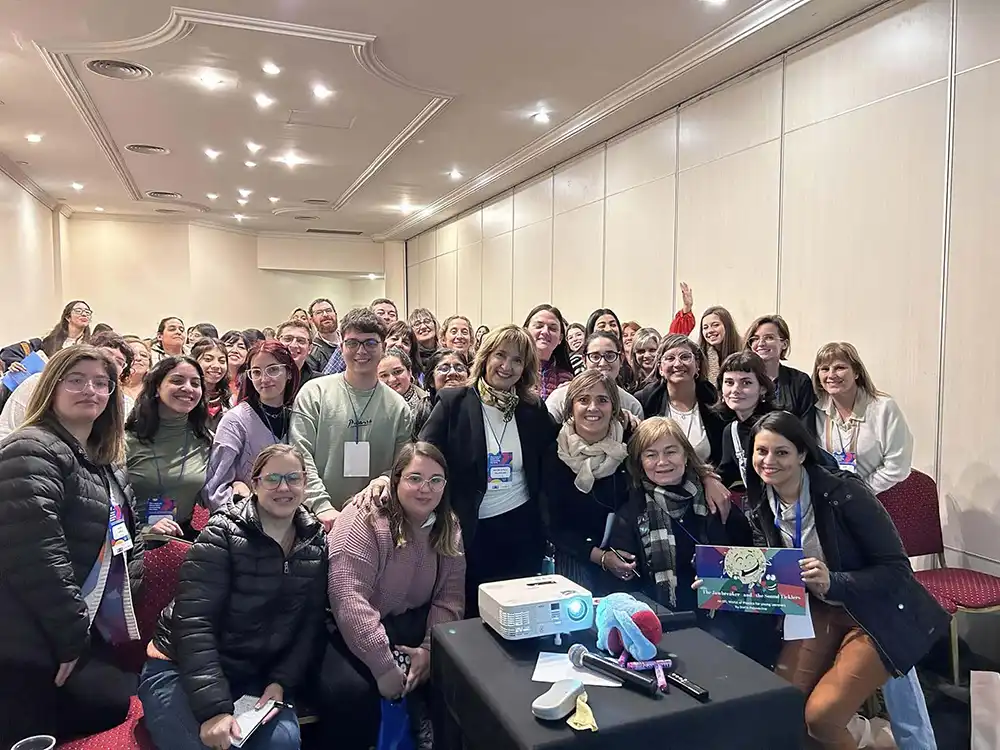
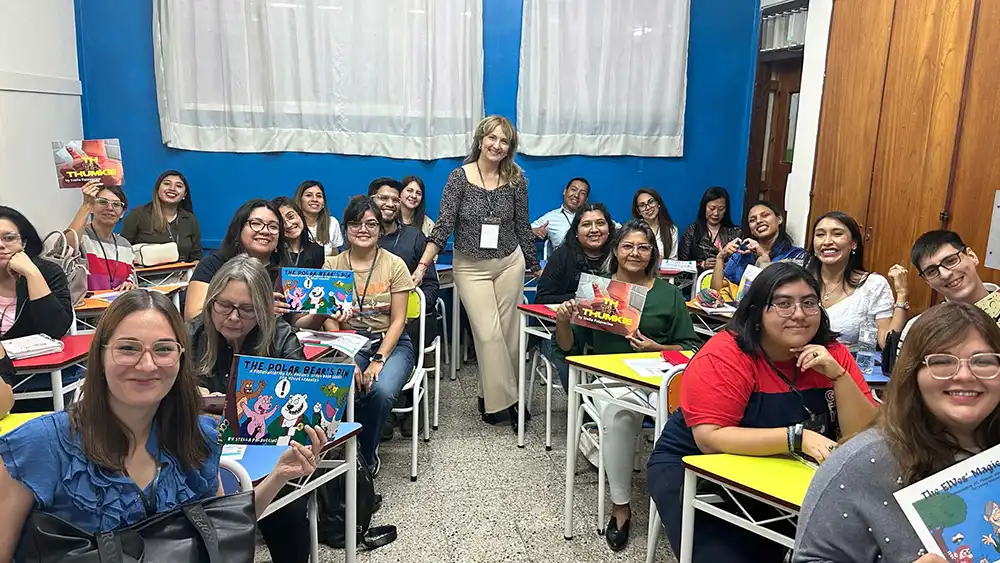
Why is pronunciation a challenge for EFL teachers?
While the Spanish phonological system consists of 26 sounds, the English phonological system may encompass up to 44 sounds, depending on the accent. Therefore, EFL learners must acquire new and additional sounds, especially to effectively engage in reading and writing in the foreign language. This presents a challenge that requires attention.
In many EFL contexts, young learners lack a strong foundation in spoken English when they begin reading or writing. To make matters worse, most approaches to reading for children rely heavily on memory. This is why ‘Phonics’ is so popular. Phonics is a systematic approach to reading based on learning the sounds that letters represent. It trains children through games, songs, and stories to associate sounds with spelling. However, the problem arises for non-native speakers of English who need to acquire the English sounds before they can recognize the letters that represent those sounds.
If teachers start using Phonics material in EFL classes without first teaching the sounds EFL learners need to know, they are likely to encounter obstacles. For instance, the difference between ‘b’ and ‘v,’ which is not distinctive in River Plate Spanish, will lead children to say ‘van’ for ‘ban’ or ‘very’ for ‘berry,’ obstructing their reading skills because the learner is unable to connect sounds with the corresponding letters. This is a common difficulty in learning to read in an EFL context.

What does science say about it?
Did you know our brains are wired for storytelling? Research has proved that when individuals are emotionally engaged in a narrative, their brains release neurotransmitters such as dopamine and oxytocin, which are associated with increased attention, motivation, and memory formation. Therefore, incorporating emotional connections into learning, as Emo-Pron does, can indeed enhance the effectiveness of educational efforts. Emo-Pron capitalises on this by weaving emotional connections into learning. When young learners are emotionally invested in a story, their brains release chemicals that enhance memory retention. So, not only do they learn pronunciation, but they remember it too!

What makes Emo-pron unique?
Through fantasy characters, children learn to associate absent sounds in their mother tongue to magic moves and letter shapes. For example, ‘The Elves’ Magic Moves’ is a story that provides a perfect scaffold to assist young learners in pronouncing the ‘v’ sound and raises awareness through the narrative conflict over the issues that may arise when there is no distinction between the letters ‘b’ and ‘v’ in languages such as Spanish.
By illustrating how Elves use specific mouth movements to create magic, children learn that the upper teeth hug the lower lip to make a magic move that brings people together in a dance. (In English, that is the proper articulation for the ‘v’ sound absent in many languages). Magic is lost when the villains make the elves fall causing them to lose their upper teeth. So the ‘vat’ turns into ‘bat’, the ‘vet’ turns into ‘bet’ and so on, losing the magic and fun until the ‘Tooth Fairy’ sends the teeth back to where they belong.
These stories not only help children remember sound articulation in the dramatic emotion that conflicts in narratives bring about, but also aid in distinguishing between conflicting sounds, such as ‘b’ vs. ‘v’ , and relate them to spelling all at once.
Teachers do not need to teach all the sounds of English. Ideally, they need to prioritise teaching those sounds that do not exist in the mother tongue because they disrupt communication and hinder reading. To this extent, some sounds have been selected to be the focus of the Emo-prom stories that can be found in the chart below:
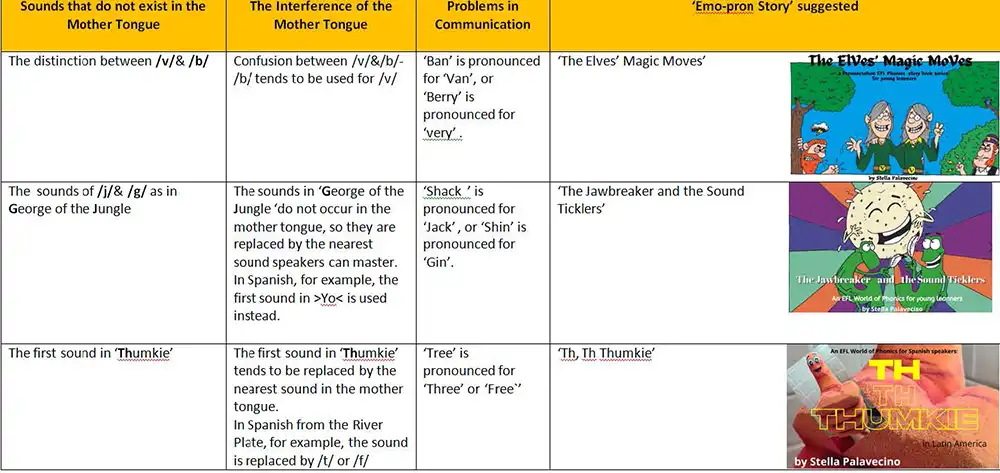
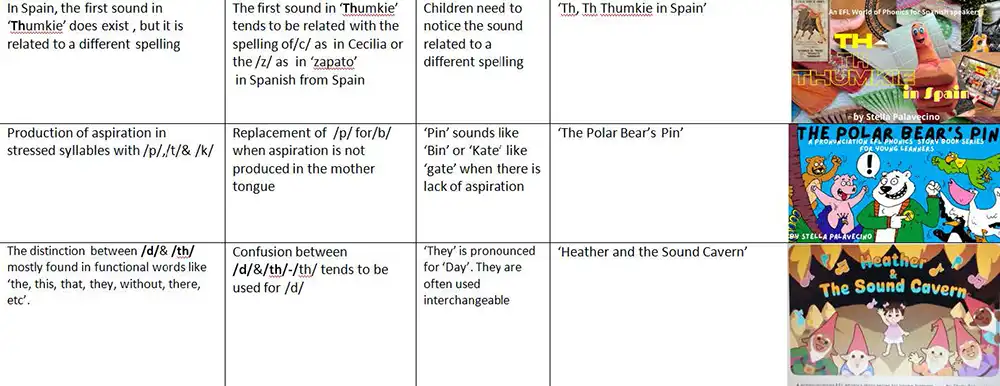

Why are Emo-pron stories suitable for young learners?
Emo-pron stories focus on emotional engagement in pronunciation acquisition. Aligning with contemporary neuro-linguistic trends, research reveals that narratives stimulate neurotransmitters, enhancing attention and memory.
Given the challenge of teaching pronunciation explicitly to children, innovative teaching methods like Emo-pron are vital as mastery in this area.
Charmingly illustrated, the stories feature fantasy characters that help children make sense of pronunciation without explicit instruction. For example, ‘The Jawbreaker and the Sound Ticklers’ vividly illustrates common language conflicts arising when the initial sounds of names like Jack are influenced by the Spanish pronunciation of ‘yo,’ resulting in transformations like ‘Jack’ for ‘shack.’ The conflict of the narrative revolves around a jawbreaker that finds a comfy sofa (the Alveolar Ridge) inside a child’s mouth, preventing the child from talking. The dramatic situation is resolved by producing the targeted sounds in unexplored places for EFL speakers. When children realize jawbreakers fear tickles, their tongues turn into feathers that tickle the jawbreakers resulting in the discovery of the place of articulation of ‘J’.
Game-like activities and repetition in meaningful contexts like songs follow, inviting children to interact with English sounds in playful and imaginative scenarios. This is how children acquire pronunciation naturally, giving life to learning languages.

Why Emo-pron Songs?
Dive into the captivating world of music, where every note becomes a gateway to mastering English pronunciation with Emo-pron! Neuroscience has unveiled the profound connection between music and emotions, a timeless bond that forms the bedrock of this innovative approach.
In the dynamic landscape of primary education, where mastering English as a foreign language poses multifaceted challenges, rhymes and songs emerge as indispensable allies for pronunciation drilling and repetition in a meaningful context. As young learners embark on their linguistic journey, Emo-pron stories infuses each lesson with melodies and rhythms, transforming the complexities of English pronunciation into an exhilarating adventure of repeating new challenging sounds to acquire naturally the sounds that are not existent in the learner’s mother tongue.
But what makes music truly magical? Delve into the realm of brain science and discover how music not only reduces stress but also enhances cognitive abilities and promotes neurogenesis. The symphony of sounds triggers neurotransmitters in the learner’s brain like dopamine and serotonin, fostering a nurturing environment for retention and practise of unimaginable places of articulation, essential elements in acquiring new EFL sounds.
Music is not just an auditory experience; it is a holistic journey that engages every facet of the brain, from cognitive function to emotional well-being. As children immerse themselves in the joy of music and movement, they embark on a voyage of social, linguistic, physical, cognitive, and emotional development, all within the embrace of meaningful contexts.
Furthermore, in the EFL classroom, every child’s voice becomes a vital instrument in shaping a sense of community and identity too. Through the universal language of music, even the most reserved learners find a safe haven to express themselves, fostering confidence and self-esteem that extend far beyond the confines of the classroom.
Here are the keys to unlocking the full potential of Emo-pron songs:
1. Immerse learners in an Emo-pron story, where feature fantasy characters help children make sense of pronunciation without explicit instruction through the power of stories and emotions. And then what?
2. Embrace the versatility of music introduced by Emo-pron stories, offering a captivating exploration of EFL sounds to provide a context for meaningful and memorable repetition.
3. Integrate Emo-pron songs and movement to stimulate all senses, ensuring that learning becomes an inclusive and joyous experience.
4. Encourage boundless creativity by crafting original songs, raps, and chants that resonate with learners on a personal level.
Join us as we orchestrate a symphony of learning that celebrates each child’s unique voice and fosters a lifelong love for language and expression.
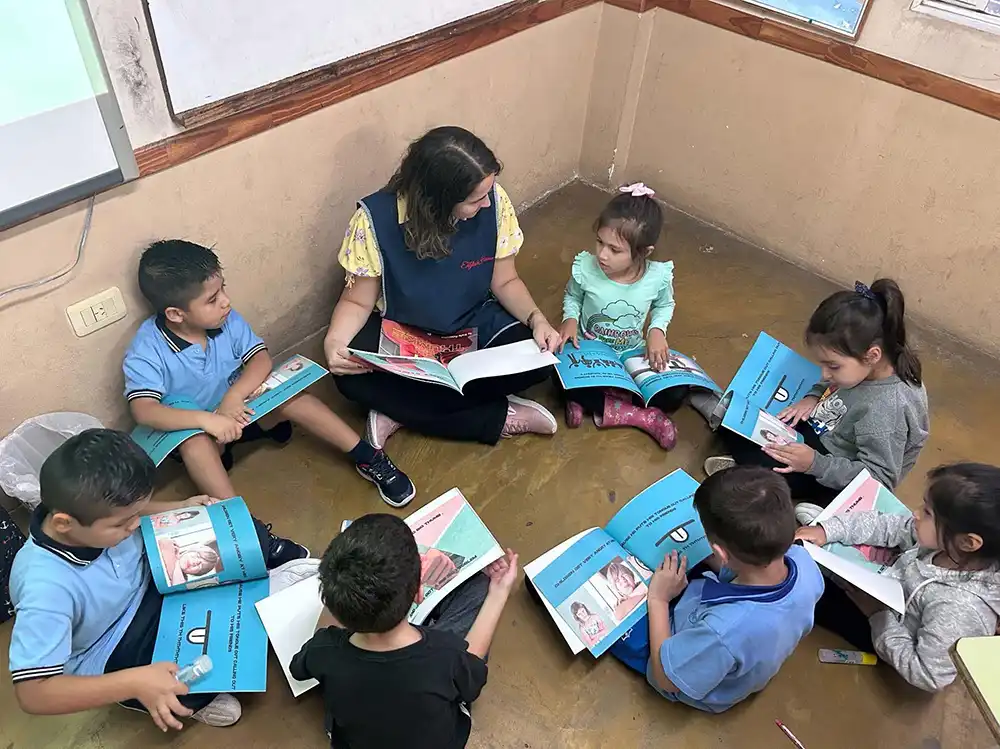
Music and Movement
Dive into the enchanting world of music, where each melody becomes a gateway to a symphony of emotions!. But the magic doesn’t stop there—emotions intertwine seamlessly with movement, creating a dynamic duo that fuels the soul and touches the learners’ hearts.
But wait, there’s more! Studies reveal that movement doesn’t just stimulate the body—it also nourishes the mind. By engaging in physical activity, you’re not only strengthening your muscles but also boosting the size of the hippocampus, the brain’s command centre for verbal memory and learning.
So why settle for static learning when you can dance your way to knowledge? Embrace the fusion of music and movement into Action Songs – they say with movements what is sung in the word lyrics and let your imagination soar as you embark on a transformative journey of discovery that will keep your mind focused on long lasting learning
Where can I buy Emo-pron story books?
Books are available in Argentina at Estari books https://estarilibros.com.ar/
Individuals from other parts of the world can buy their books by contacting

